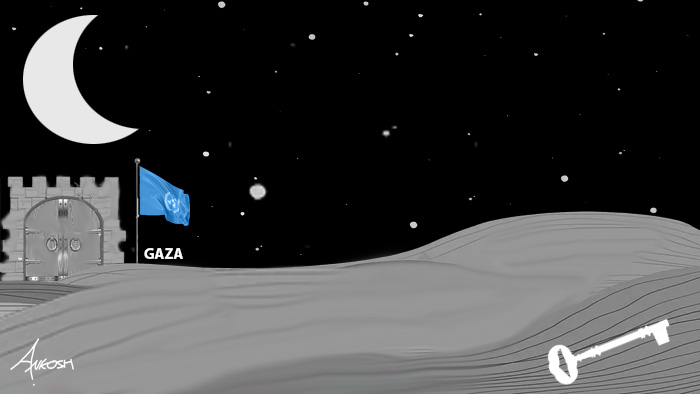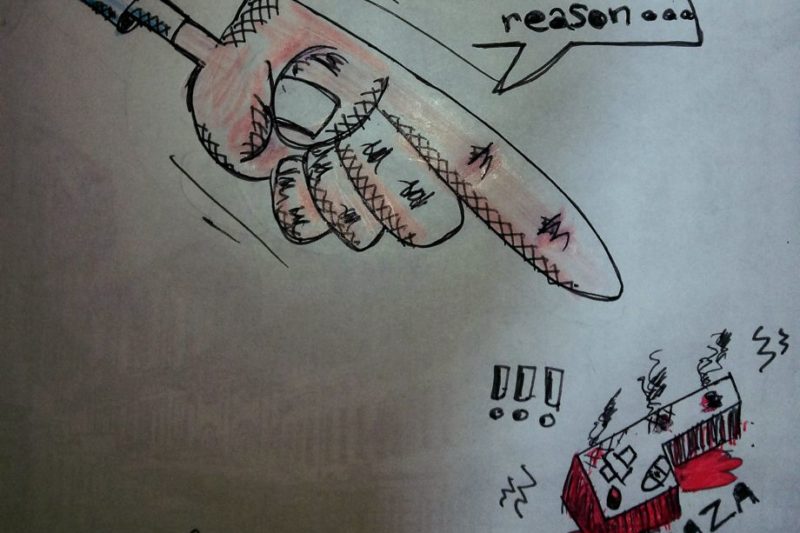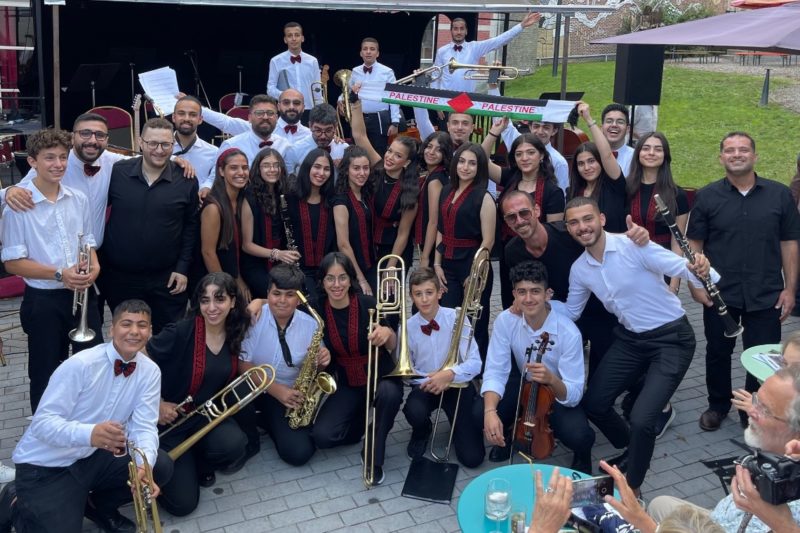Palestinian Journalism is not a crime in Gaza
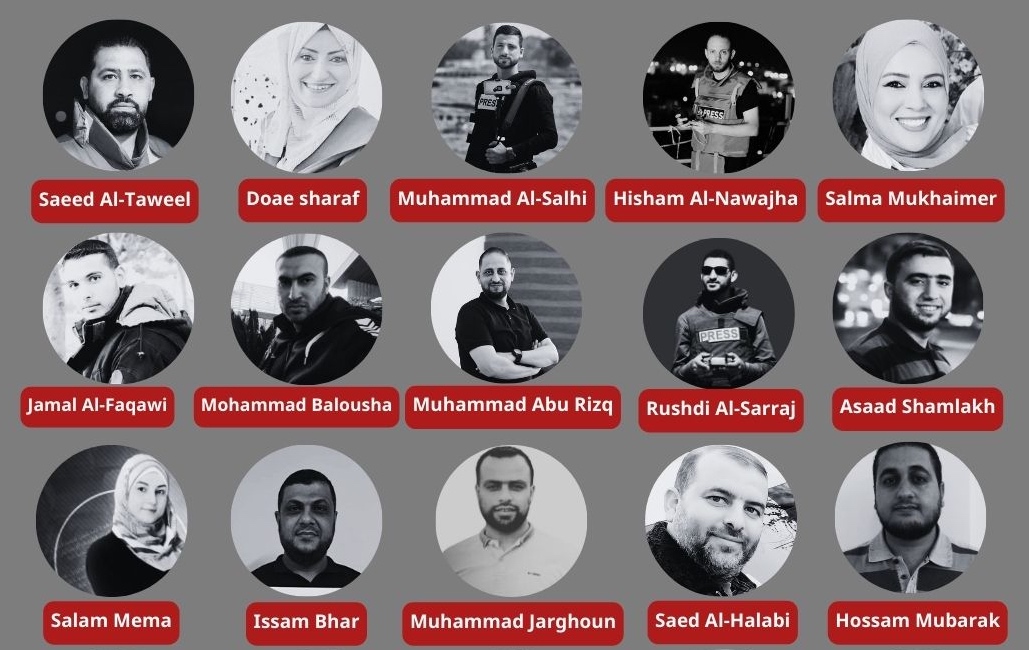
Since Hamas launched its Al Aqsa Flood operation on Israel on October 7, 2023, causing thousands of civilian deaths on both sides, at least 33 Palestinian journalists and media workers have been killed, several have been injured and others are still missing according to the Palestinian Journalists Syndicate – PJS and the International Federation of Journalists (IFJ).
The consequences of the Gaza war have been dramatic : thousands of Palestinian civilians have lost their lives, most of them women and children.
The International Federation of Journalists (IFJ) and the Palestinian Journalists Syndicate (PJS) condemn the killings and ongoing assaults on journalists by the Israeli army, sounds the alarm and expresses its deep concern for the lives of fellow journalists in Gaza.
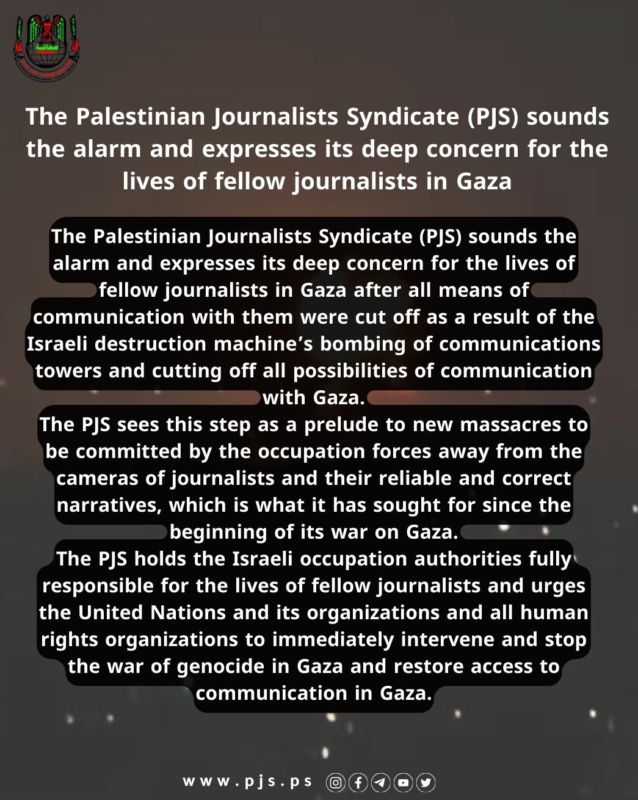
The 22-year-old Palestinian journalist, Plestia Alaqad, who works as a freelance journalist and influencer on social media in Gaza, expressed, “his is not the first aggression that happens in Gaza, I have lived through all aggressions and intifadas. However, what is happening in Gaza right now is like nothing I have ever experienced, a literal massacre is happening.”
What is happening in Gaza right now is like nothing I have ever experienced.
Alaqad added, “What I witness daily is far from normal; is not something that should happen, seeing kids getting killed, getting murdered, not even in one piece, their bodies torn apart, like a leg here and hand there, It’s terrible, it’s terrible, These are the scenes that we, as journalists and residents of Gaza, are subjected to on a daily basis, Moreover, my role as a journalist has become increasingly impossible with each passing day.”
Alaqad further added, “My job as a journalist is becoming increasingly challenging due to issues like electricity, the state of the internet, and the severe shortage of fuel. This fuel shortage makes it incredibly difficult to move from one location to another to cover the events. I barely have Internet connection or electricity to charge my phone. Nevertheless, I’m trying my best, I’m trying as much as I can to post about what’s happening in English because I want the world to see what’s happening. I want the world to have some humanity, I want them to stop watching and to take action. Every passing day, hour, minute, second, death only becomes closer. Literally, I can lose my life, any minute here in Gaza, any minute I can get get killed and I’ll be just a number.”
Anadolu Agency photojournalist Ali Jadalla’s house was bombed during Israeli airstrikes, resulting in the loss of his brothers and his father. Ali had to carry his father’s body in his own car to bury him after he was killed because of the lack of ambulances and he numerous number of people killed in Gaza.
I always take pictures of events, but today I found myself becoming the event.
He said, “For years, I documented the suffering of my people as their homes were bombed and reduced to rubble, leaving them homeless. However, the time has come for me to share my own story of tragedy and grief, for I too am Palestinian. An Israeli airstrike struck my home, erasing my memories, hopes, and struggles. Nonetheless, the fact that God saved my family and me from the bombing is enough for me.”
Jadallah also said, “I always take pictures of events, but today I found myself becoming the event, when I saw my mother alive and being rescued from under the rubble, I was able to gather my strength and continue my mission reinforcing the fact that there is no safe place in Gaza, everyone is living in danger. I constantly communicate with my children to ensure their safety, but I am unable to see them when they are in a different location. We feel danger everywhere during our journalistic coverage, we could be targeted at any time, and I feel intense pain and sorrow when I see anyone losing their loved ones, just as I have lost mine. War is brutal and tragic, and it must stop immediately. Life in Gaza feels as if a nuclear bomb has dropped over us, just like what happened in Hiroshima.”
Ibrahim Qannan, a Palestinian journalist working for Alghad-TV, sustained injuries while covering the events during the war on Gaza.
Qannan said, “We as journalists have been covering the news since the the beginning of the war on October 7th, I was stationed at Nasser Hospital in the southern Gaza Strip, Khan Yunis, preparing for a live broadcast when a nearby ambulance was targeted, resulting in my injury and the injury of my colleague, the photographer, and 13 other injuries. We were quickly treated and returned to our journalistic duties. We operate under very harsh and challenging conditions, especially given the rising number of journalists losing their lives due to Israeli attacks. There is no safe place, a constant sense of fear accompanies us,we can not move freely, and we live under the risk of death at any moment, even while carrying our Press IDs.
Our mental and emotional state is deteriorating as we witness children being killed and injured, We document the very harsh events and images. Fear always accompanies us because we are far from our children and families. When Israel targets a house, it often results in widespread destruction in the targeted area. Covering this war is extremely difficult because Israel does not distinguish between a journalist, a civilian, a paramedic, or a doctor.”
Cut off from communications and Internet
Israeli airstrikes destroyed large parts of the Al-Rimal neighborhood in Gaza City, including Telecommunications Company building, causing a widespread outage of communications and the internet.
Qannan further emphasized, “The issue of internet and communication is a major challenge for us. We encounter significant challenges when trying to communicate with external channels that we collaborate with, due to the severe limitations of our internet networks,we can’t rapidly gather news and transmit visual materials. In fact, this problem has taken on greater significance for us than the challenges of securing food and water.”
The Palestinian journalist Yara Eid says while crying on her Instagram page, “Today, Israel killed Roshdi Al Sarraj, a Palestinian journalist, my mentor, my manager,I feel compelled to share the story of Roshdi, who he was, and his dreams. Roshdi, at the age of 31, was not only a journalist but also a father. In 2008, he and his best friend Yasser Mortaja started working on their for photography and filmmaking.”
Later in 2012 they were able to establish Ain Media a Film Production Company, Initially, their aim was to create films and documentaries that depict life in Gaza, they wanted to tell the world that Gazans love and have hope and have life, But later, they were compelled to become journalists because of the horrible atrocities that are being committed against Palestinians in Gaza every single day.
Eid added, “Yasser Mortaja was also 31 years old when he was killed by Israeli forces in 2018, He had been visibly marked as a member of the press while covering the Great March of Return protests, yet he was targeted and killed. Roshdi was devastated, he never imagined losing his best friend, companion, and partner just like that, Roshdi continued expanding Ain Media and working to turn it into an international organization, Working with many international journalists, Roshdi covered every single aggression on Gaza since 2012, and he lived through six aggressions. Today, Israeli warplanes targeted his family’s home , where Roshdi was with his whole family , He was the one who was killed , a few days ago, our journalist friend Ibrahim Lafi was also killed.”
Yara, please continue with what you’re doing because you are our only voice and hope.
I maintained daily contact with Roshdi, and he repeatedly urged me, saying, “Yara, please continue with what you’re doing because you are our only voice and hope. In Gaza, we barely have internet and communication, our coverage remains quite limited.” When I lost 30 members of my family, Roshdi told me to stay strong, saying, “I am your family, we are all your family”. But Israel killed my family.”
Israel keeps targeting journalists and bombing their homes, resulting in the loss of their families, because they are fully aware that we, as journalists, are the ones who can expose the reality of what’s happening. They understand that we are capturing and documenting everything they are doing against our people and our children, they are so threatened by our voices and our commitment to the truth.
I will do my best to ensure that their sacrifices are not in vain.
“For Yasser, Ibrahim, Roshdi, and every one of my colleagues who have been killed, I will persist in my reporting. I will continue to unveil the truth, and I will not stop, I will do my best to fulfill their dreams and ensure that their sacrifices are not in vain”, Eid said.


